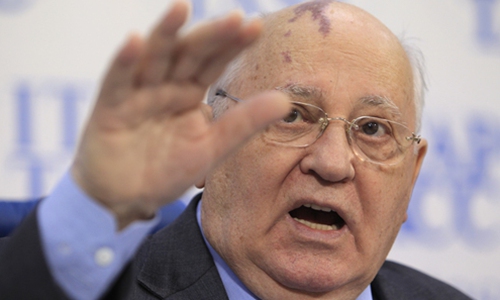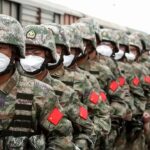Chinese observers and netizens on Wednesday shared the mixed feeling about controversial politician Mikhail Gorbachev’s passing away on Tuesday. While the West remembered him and praised his historical role for bringing the Soviet Union closer to the West and ending the Cold War, Chinese observers considered him as a tragic figure who catered to the US and the West without principle, made severe mistakes in judging the international situation, and caused chaos in domestic economic order, which all serve as a reminder to other countries to stay cautious about any attempt of “peaceful evolution” by Western forces.
In a historical reflection, Gorbachev is naïve and immature, who represented a certain historical period of Russia (USSR) shifting between the paths of “seeking an independent way” and “embracing the West,” some observers said. Blindly worshipping the Western system made the USSR, lose independence, and the Russian people suffered from the political instability and severe economic pressure, which China considered as a major warning and lesson to draw experience from for its own governance, observers said.
Gorbachev has died on Tuesday at the age of 91, TASS reported. He was the first and the last Soviet president, resigning on December 25, 1991 when the Soviet Union ceased to exist at the same time.
Russian President Vladimir Putin offered his deepest condolences over the passing of Gorbachev, Russian media reports said, citing Kremlin Spokesperson Dmitry Peskov.
UN Secretary-General Antonio Guterres also extended his condolences, calling Gorbachev a statesman who changed the course of history and “did more than any other individual to bring about the peaceful end of the Cold War,” according to media reports.
In 1985, Gorbachev became general secretary of the Central Committee of the Communist Party of the Soviet Union.
During his time in office, Gorbachev aimed to re-energize the stalled Soviet economy, which was riddled with inefficiency, overblown defense spending and creeping corruption. He called for urgent reorganization and modernization, but soon expanded his reform to the political and social structure of the whole nation, RT said.
The policy of “perestroika” was announced in 1986 as an attempt to reorganize the economy, and another policy proclaimed “glasnost” with the aim of bringing transparency into society. He also proposed a constitutional change to move to a presidential system and created a new political body called the Congress of People’s Deputies, according to the Russia media reports.
Gorbachev’s foreign policy, also known as the “new thinking,” marked a period of significant improvement of relations between the Soviet Union and Western countries, replacing the era of Cold War hostilities, and in 1986, he announced plans to withdraw Soviet troops from Afghanistan, but it took three more years to complete the pullout.
The partial democratization of Soviet society under Gorbachev led to a surge in nationalist and anti-Russian sentiment in most of the 15 Soviet republics, and the Soviet Union collapsed with dramatic speed during the latter part of 1991 with the former Soviet leader facing tremendous criticism, most at home.
“During the period he was in the office as the top leader of the USSR, he made severe mistakes in judging both domestic and international situations, and the facts proved that the policies rolled out were catastrophic to the country,” a Beijing-based veteran expert on international affairs who spoke on the condition of anonymity told the Global Times on Wednesday.
These mistakes caused the chaos in domestic economic order, making the public lose confidence in the country’s system; instead of safeguarding national interests, the foreign policy was defined by the US-led West, the expert noted. Such immature governance left long-lasting pain for Russia until today, he said.
Some Chinese observers often referred to Gorbachev as “the one bringing ruin upon himself.” Over the past decade, Russian top leader Vladimir Putin has been learning from the lessons of the Soviet leader in the 1990s, adhering to the country’s own path, observers said.
As a lesson for China’s own governance, the Communist Party of China upholds its own socialist path with Chinese characteristics, underscoring political maturity and sobriety.
“Gorbachev was deceived by the West. At the critical moment, he could not save the USSR nor the Communist Party of the Soviet Union,” Wang Yiwei, director of the Institute of International Affairs at the Renmin University of China, told the Global Times on Wednesday.
China’s opening-up is based on the four principles including insisting on the Party’s leadership and on the principle of independence, rather than seeking Westernization like the USSR, Wang said.
(Global Times)




